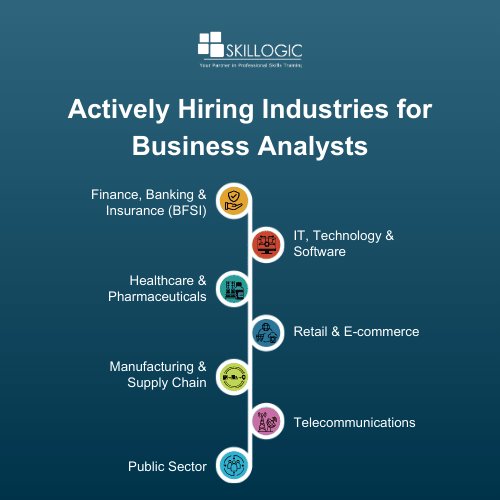Top Industries Hiring Business Analysts in 2025
Discover the top industries hiring business analysts in 2025 and explore where the biggest opportunities lie. From IT and finance to healthcare, e-commerce, and telecom, learn how evolving technologies, digital transformation, and data-driven strategies are driving the demand for skilled business analysts across sectors.

In 2025, business analysts play a more vital role than ever. As industries embrace digital transformation, artificial intelligence, and data-driven decision-making, skilled analysts are the link between strategy, operations, and technology. From optimizing supply chains to guiding AI adoption, companies are relying heavily on professionals who can turn insights into action.
If you are looking to start or advance your career in this field, it is essential to know which industries are actively hiring. This article explores the top industries hiring business analysts in 2025, supported by recent research, market forecasts, and real-world examples.
Why Business Analysts Are in High Demand in 2025
The role of a business analyst has evolved beyond documentation and requirement gathering. Today, analysts are expected to be problem solvers, strategic advisors, and translators of complex data insights.
Recent developments highlight this shift. AI-powered digital services in technology and healthcare are accelerating the demand for analysts who can align AI insights with business goals. EPAM Systems, a global software provider, raised its 2025 revenue forecasts, crediting client investments in AI across financial services, healthcare, software, and consumer goods.
In manufacturing and logistics, AI is being integrated into just-in-time systems to weather economic and tariff uncertainties. Markets and Markets reports predict that the AI in the supply chain market will experience significant growth, rising from about USD 9.15 billion in 2024 to roughly USD 40.53 billion by 2030, registering a CAGR of 28.2% over the forecast period. This trend creates a massive need for human analysts to interpret AI-driven data and make strategic recommendations.
Read these articles:
- Why Domain Knowledge Matters for Every Business Analyst
- How Generative AI is Reshaping the Business Analyst Role
- Why Business Analysts Are the Secret Weapon of Start-ups

Top Industries Hiring Business Analysts in 2025
Here’s a clearer breakdown of the top industries hiring business analysts in 2025, based on the latest insights and labor-market trends:
1. IT and Software Development
Technology companies are using AI to enhance products and services, but human expertise is still essential to ensure these innovations meet user needs and business objectives. In this field, analysts collaborate closely with developers, product managers, and stakeholders to convert business requirements into effective technical solutions.
Example: Mid-sized software companies are shifting from traditional SaaS models to AI-native solutions. Analysts are vital in aligning product features with measurable business outcomes, ensuring a smooth transition for customers.
Why in demand:
- Continuous innovation in software products
- Rising adoption of cloud platforms and AI
Example roles: IT Business Analyst, Systems Analyst, Product Owner
2. Banking, Financial Services, and Insurance (BFSI)
The BFSI sector is undergoing rapid digital transformation with the adoption of fintech solutions, mobile banking, and automated compliance systems. Business analysts here help improve fraud detection, customer onboarding, and regulatory compliance processes.
EPAM’s revenue growth in 2025 has been driven significantly by AI adoption within financial services, underscoring the importance of analysts who can manage both technological and regulatory complexities.
Why in demand:
- Expansion of digital payment systems
- Stringent compliance requirements
Example roles: Risk Analyst, Banking Operations Analyst, Compliance Specialist
3. Healthcare and Pharmaceuticals
The healthcare sector is embracing telemedicine, AI-powered diagnostics, and electronic health record systems. Business analysts ensure these solutions meet clinical needs, regulatory standards, and patient expectations.
Example: Analysts in pharmaceutical companies play a key role in supply chain optimization for medical supplies, ensuring timely delivery to hospitals while complying with health regulations.
Why in demand:
- Widespread digital health adoption
- Strong focus on patient data security
Example roles: Healthcare Business Analyst, Clinical Data Analyst, Health IT Consultant
4. E-commerce and Retail
Online retail is booming in 2025, with businesses focusing on personalization, predictive analytics, and customer experience. Analysts are needed to interpret sales trends, manage inventory systems, and optimize the buyer journey.
Example: A leading e-commerce brand used business analyst insights to redesign its checkout process, reducing cart abandonment rates by 15 percent in one quarter.
Why in demand:
- Rapid growth of online shopping platforms
- AI-driven product recommendations
Example roles: Retail Operations Analyst, E-commerce Data Analyst, Customer Experience Analyst
5. Manufacturing and Supply Chain
Manufacturing firms are moving towards Industry 4.0 with AI, IoT, and automation in their operations. Business analysts help design workflows, improve production efficiency, and manage complex global supply chains. An IMARC report forecasts India’s supply chain analytics market to grow at a 20.6 percent CAGR from 2025 to 2033, reaching 2.39 billion USD. This growth indicates significant opportunities for analysts in manufacturing and logistics.
Why in demand:
- Need for resilient and agile supply chains
- Adoption of predictive analytics for inventory planning
Example roles: Process Improvement Analyst, Operations Business Analyst, Supply Chain Analyst
6. Government and Public Services
Governments worldwide are modernizing legacy systems to improve public services. Analysts work on digital transformation projects, policy implementation, and data governance.
Example: A state government in India implemented an e-governance system where business analysts played a crucial role in requirement gathering and workflow design, resulting in faster processing times for public services.
Why in demand:
- Push for transparent and efficient public services
- Expansion of e-governance initiatives
Example roles: Policy Implementation Analyst, Public Sector Business Analyst, Data Governance Specialist
7. Telecommunications
The rollout of 5G networks is enabling telecom companies to broaden their range of offerings. Analysts support network optimization, service delivery improvement, and the launch of new digital services. India’s 5G services market is projected to grow at a 54% CAGR (2025–2033) to $41B, and broader mobile services revenue is expected to rise to $39.3B by 2029, supporting hiring across product, CX, and network analytics. (Source: The Economic Times)
Example: A telecom provider leveraged business analysts to improve customer support automation, reducing average query resolution time by 30 percent.
Why in demand:
- Expansion of 5G and IoT
- Intense competition driving innovation
Example roles: Telecom Business Analyst, Service Delivery Analyst, Network Optimization Analyst
Read these articles:
- Advanced Business Analysis Techniques for Professionals
- How to Conduct a SWOT Analysis: A Business Analyst’s Approach
- How Business Analysts Drive Digital Transformation
Essential Skills for Business Analysts in 2025
Here’s a refined list of essential business analyst skills in 2025, blending current trends with forward-looking perspectives:
Technical Skills:
- Creating data visualizations with tools such as Power BI and Tableau
- SQL and database management
- Agile and Scrum methodologies
- Understanding of AI and automation tools
Soft Skills:
- Strong communication and stakeholder management
- Analytical problem-solving
- Adaptability to industry-specific challenges
Core Business Analyst Roles & Salaries in India
Business Analysts play varied roles across functions and organizational levels. According to industry definitions and professional frameworks:
Business Analyst
In Bengaluru, the average salary for Business Analysts with 1–9 years of experience ranges from ₹3.5 Lakh to ₹19 Lakh per year, as per AmbitionBox. Bengaluru’s strong IT and analytics ecosystem contributes to competitive pay, especially for professionals skilled in data visualization, SQL, and business process management.
In Pune, Mumbai, and Hyderabad, salaries range from ₹3 Lakh to ₹17 Lakh annually, with slight variations based on the cost of living and the density of multinational companies in each city. These locations have emerging analytics hubs where demand for skilled analysts continues to grow. (Source: AmbitionBox)
Business System Analyst
In Bengaluru, Business System Analysts earn between ₹4.5 Lakh and ₹26.4 Lakh per year. This higher upper range reflects demand for professionals adept at integrating IT systems with business processes.
In Hyderabad, salaries range from ₹4.5 Lakh to ₹23 Lakh, driven by the city’s expanding IT services and product-based companies.
In Pune, pay ranges from ₹4.2 Lakh to ₹23.1 Lakh annually, with fintech and manufacturing domains showing strong hiring trends.
By industry, Business System Analysts in Software Product companies can expect ₹5 Lakh to ₹30 Lakh per year, while those in FinTech, Internet, Analytics, and KPO sectors earn ₹4.6 Lakh to ₹25.6 Lakh. These industries offer higher packages due to the complexity of systems and the need for domain-specific expertise. (Source: AmbitionBox)
Business Analyst Specialist
In Bengaluru and Pune, professionals with 5–16 years of experience earn between ₹9.2 Lakh and ₹30.7 Lakh annually. This reflects senior roles involving strategy, cross-functional leadership, and large-scale project execution.
In Chennai, the salary range is slightly higher at ₹11 Lakh to ₹30.5 Lakh, driven by strong demand in consulting and IT services.
By industry, specialists in FinTech, Telecom, and Software Product companies earn between ₹13 Lakh and ₹32 Lakh, often due to niche skills in financial modeling, product strategy, and high-stakes decision-making. (Source: AmbitionBox)
These salary trends indicate that location, experience level, and industry domain play a significant role in determining pay scales for Business Analyst roles in India. Bengaluru, Chennai, and Pune remain top-paying cities, while specialized industries such as FinTech and Software Product development offer the highest salary brackets for experienced professionals.
The top industries hiring business analysts in 2025 are those undergoing significant digital transformation, adopting AI, and focusing on customer-centric strategies. From IT to BFSI, healthcare, retail, manufacturing, and beyond, opportunities are abundant for professionals with the right skills.
If you are considering this career path, now is the time to invest in skills such as data analytics, AI literacy, and domain-specific knowledge. By doing so, you can position yourself for a high-growth, future-proof career in one of the fastest-growing professions today.
To excel in your business analysis career, begin mastering your domain now as a deep understanding of the business context is essential to delivering real value.
If you're looking to break into this rapidly growing field or elevate your current role, the right training can be a game-changer. Enrolling in a Business Analyst course in Pune can help you strengthen your foundations with practical, hands-on learning, making you job-ready in industries where the demand for skilled professionals is at an all-time high.
Similarly, learners exploring Business Analyst courses in Hyderabad gain access to specialized training tailored to real-world scenarios, helping them bridge the gap between theoretical knowledge and practical application. With the city’s strong IT presence and thriving analytics community, Hyderabad is becoming one of the top destinations for aspiring analysts to upskill.
At SKILLOGIC, learners benefit from industry-relevant programs designed for today’s evolving business needs. With globally recognized certifications and training in Six Sigma, PMP, cybersecurity, and cloud technologies, SKILLOGIC has established itself as a trusted partner for professionals across India and beyond. Offering both online and offline coaching, SKILLOGIC ensures that learners are well-prepared to succeed in the digital economy, whether they are just starting out or looking to advance into senior roles.

0
598